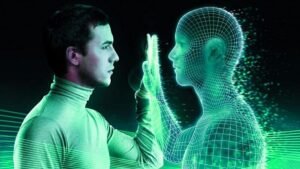Delving into the Depths of Simulation: Unraveling the Layers of Reality
Introduction:

In the vast landscape of philosophical inquiries and scientific endeavors, few concepts captivate the human imagination as profoundly as the Theory of Simulation. Stemming from the ancient philosophical ponderings of reality and existence, the notion that our universe might be but a simulation has gained traction in modern discourse, fueled by advances in technology, cosmology, and computer science.
In this comprehensive exploration, we embark on a journey to dissect and analyze the intricacies of the Theory of Simulation. From its historical roots to its implications for our understanding of existence, consciousness, and the very fabric of reality, we delve deep into this thought-provoking concept, inviting readers to ponder the profound questions it raises.
Origins and Evolution of the Theory:
The seeds of the Theory of Simulation can be traced back to ancient philosophical traditions, where thinkers grappled with the nature of reality and the existence of higher realms beyond the physical world. Plato’s Allegory of the Cave, for instance, presented a metaphorical framework suggesting that our perception of reality might be but shadows cast by a higher reality.
Fast forward to the modern era, and the emergence of computer science and technology provided fertile ground for the growth of the simulation hypothesis. From the pioneering work of mathematicians like John von Neumann to the seminal thought experiments of philosophers like Nick Bostrom, the idea that our universe could be simulated by advanced civilizations gained momentum.
Key Concepts and Frameworks:
At the heart of the Theory of Simulation lies the notion that our reality is akin to a computer-generated simulation, programmed and governed by rules and algorithms. This raises profound questions about the nature of consciousness, free will, and the role of observers within the simulation.
One key concept is the “Simulation Argument” proposed by Nick Bostrom, which posits that at least one of the following statements must be true: (1) civilizations at our level of technological development will never reach a stage where they can simulate conscious beings; (2) civilizations with the capability to simulate conscious beings choose not to do so; or (3) we are almost certainly living in a simulation.
Another important framework is the “Simulation Hypothesis,” which suggests that our universe could be a simulation created by a highly advanced civilization. This civilization, often referred to as “post-humans” or “simulators,” would possess the technological prowess to simulate entire universes, potentially including conscious beings.
Implications and Philosophical Ramifications:
The Theory of Simulation has profound implications for our understanding of reality, consciousness, and the nature of existence. If our universe is indeed a simulation, what does this imply about the nature of our reality? Are we merely characters in a cosmic script, or do we possess agency and autonomy within the simulation?
Furthermore, the simulation hypothesis raises questions about the existence of other simulated realities and the possibility of nested simulations. If our universe is a simulation, could the simulators themselves be part of a higher-level simulation? This recursive possibility opens up a dizzying array of philosophical conundrums.
Moreover, the ethical and existential implications of the simulation hypothesis are far-reaching. If our reality is simulated, what does it mean for concepts like morality, purpose, and the afterlife? Are we accountable to our creators, or are we free to carve out our own destiny within the confines of the simulation?
Scientific Investigations and Technological Advances:
While the Theory of Simulation may seem like a purely speculative concept, it has sparked significant interest among scientists, philosophers, and technologists alike. From thought experiments exploring the computational limits of reality to experimental efforts aimed at detecting signs of simulation, researchers are actively engaged in probing the boundaries of our understanding.
One avenue of investigation involves searching for “glitches” or anomalies within the fabric of reality that could betray its simulated nature. Whether it be deviations from expected physical laws or subtle patterns indicative of underlying computational processes, scientists are exploring various avenues for uncovering evidence of simulation.
Furthermore, advances in quantum computing and artificial intelligence are shedding new light on the feasibility of creating simulated realities. As our computational capabilities continue to expand, the prospect of creating increasingly complex and immersive simulations becomes ever more plausible.
Ethical Considerations and Societal Impacts:
As we contemplate the implications of the Theory of Simulation, it is essential to consider the ethical ramifications and societal impacts of such a paradigm shift. The prospect of living in a simulated reality challenges fundamental assumptions about the nature of existence and our place within the cosmos.
Ethical questions arise regarding the rights and responsibilities of simulated beings, as well as the implications of potentially “turning off” or modifying the parameters of the simulation. Furthermore, the existential angst stemming from the realization that our reality may be but a digital construct raises concerns about psychological well-being and existential crises.
From a societal standpoint, the widespread acceptance of the simulation hypothesis could reshape our cultural narratives and religious beliefs. Traditional notions of divinity and transcendence may give way to a more mechanistic understanding of reality, prompting profound shifts in our worldview and value systems.
Conclusion:
In the labyrinthine corridors of philosophical inquiry, the Theory of Simulation stands as a beacon of intellectual curiosity, beckoning us to peer beyond the veil of perceived reality and contemplate the nature of existence itself. While the notion that our universe might be a simulation remains speculative, its implications reverberate across disciplines, challenging our assumptions and inviting us to ponder the profound mysteries of the cosmos.
As we continue to unravel the layers of simulation theory, we embark on a voyage of discovery, guided by the twin beacons of reason and imagination. Whether our reality is but a simulation or a genuine manifestation of the cosmos, one thing remains certain: the quest for truth and understanding is a journey without end, beckoning us ever onward into the unknown depths of existence.
